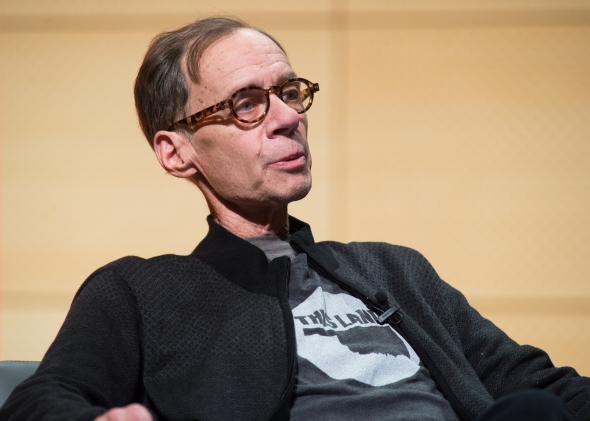Gaunt and battle-scarred, with a raspy voice and a keen bullshit detector, New York Times media columnist David Carr would have been easy to mistake for a cynic. In the stunned hours that followed news of his death Thursday at 58, admirers and mourners reminisced over a legendary video clip from the documentary Page One.
In it, Carr took emphatic issue with Vice Media CEO Shane Smith’s insinuation that his startup’s reporting on Africa was sharper and realer than that of mainstream news organizations like the Times. With a few steely words, Carr cut Smith down and left scraps of his diced ego strewn across the conference room. For those who resent the incursion of buzzy, millennial-focused digital media companies into the Times’ turf, it was a singularly gratifying moment:
And yet it’s misleading to trumpet this clip as a defining example of what made Carr one of the most admired and beloved men in all of journalism. It’s true that his patience for hubris and doublespeak was thin. His deeply reported and acid-tipped 2010 takedown of the Tribune Company’s “bankrupt culture” was the epitome of hard-hitting media reporting. He was also self-deprecating about his ignorance of technology. “What the fuck is an algorithm?” he once joked. But Carr was not a curmudgeon. If anything, he had a soft spot for the same new-media upstarts that his Times colleagues tended to regard with the sniff of an upturned nose.
Carr defended BuzzFeed before it was cool, calling it “a player in news” as early as February 2012. In 2014, he accepted a professorship at Boston University focused on new business models in journalism. In an introductory discussion transcribed by BU Today, the dean of BU’s College of Communication, Tom Fiedler, pointed incredulously to BuzzFeed’s forays into investigative journalism. “What do you make of that?” he asked Carr. “Can it be taken seriously?” Carr didn’t hesitate: “Of course it can be!” He went on to point out that, in his experience with online-media startups, “Anytime they get a little money … they go out and hire journalists.” They can’t match the New York Times’ journalism today, he said—but “20 years from now I’m not sure you’ll be able to tell the difference.” His full response is below:
On his Media Decoder blog, Carr reported earnestly and without condescension on Upworthy in July 2012. He later shared a stage with Upworthy founder Eli Pariser at SXSW. Carr asked Pariser hard questions: Can’t readers recognize clickbait when they see it? Does Upworthy, started by a man who coined the term “filter bubbles,” risk trapping readers in a filter bubble of its own? And is it adding real value, or just gamifying the news? He didn’t ask those questions to belittle Upworthy. He asked them because he took it seriously as a journalistic enterprise.
When Ezra Klein left the Washington Post for Vox Media in 2014, old-guard pundits scoffed or scratched their heads. Not Carr. He wrote a thoughtful, definitive Times column placing the digital media explosion in historical context by comparing it to the rise of cable television in the 1980s. “Organizations like BuzzFeed, Gawker, The Huffington Post, Vice and Vox, which have huge traffic but are still relatively small in terms of profit, will eventually mature into the legacy media of tomorrow,” he wrote. “What we are witnessing now is not the formation of a bubble, it is the emergence of a lasting commercial market, a game that has winners and losers, yet is hardly zero sum.”
Where other Times journalists shied from Twitter, Carr embraced it early on, building a following of almost half a million with his pithy insights and witty asides. When Philip Seymour Hoffman died, he posted a beautiful eulogy for the actor on Medium. He was once even reprimanded by the Columbia Journalism Review for going too soft on the journalistic sins of BuzzFeed and its ilk.
And as for that famous, touchy exchange with the feckless Vice executives? Ultimately, Carr wasn’t as proud of it as many of his admirers were. (That his daughter worked there for a time may have played a role in this softening.)
In a 2014 column headlined, “Its Edge Intact, Vice Is Chasing Hard News,” Carr reflected on his earlier dismissal of the company’s foreign-reporting ambitions:
Being the crusty old-media scold felt good at the time, but recent events suggest that Vice is deadly serious about doing real news that people, yes, even young people, will actually watch. And given that Vice has been in talks with Time Warner for a partnership that may include its bringing its guerrilla aesthetic to an entire news channel, it’s worth looking at its growth and development as a source of hard news.
That was Carr: crusty on the outside, but deeply sympathetic at his core. He was never one of those nostalgists who lamented the decline of some journalistic halcyon age. A brilliant, flawed man who had lived through a hell of his own making, Carr didn’t let the sins of others obscure their virtues. And he was convinced that the news itself had a future as brilliant, and as flawed, as its past.
Correction, Feb. 18, 2015: This post originally misidentified the panelist who asked David Carr what he made of BuzzFeed’s forays into investigative journalism. It was Tom Fiedler, dean of Boston University’s College of Communication, not former Bloomberg Media Group chairman Andrew Lack.
